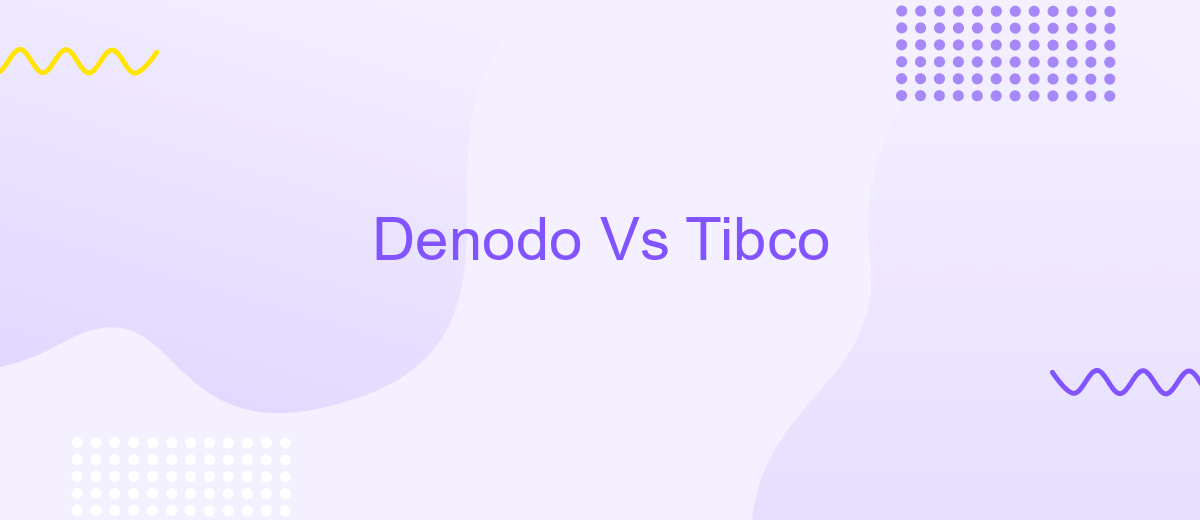Denodo Vs Tibco
In today's data-driven world, choosing the right data virtualization tool is crucial for businesses aiming to streamline their data management processes. This article delves into a comparative analysis of two leading platforms, Denodo and Tibco, examining their features, performance, and overall value. By understanding the strengths and weaknesses of each, organizations can make informed decisions to enhance their data strategy.
Overview
Denodo and Tibco are two prominent platforms in the field of data integration and management, each offering unique features to cater to business needs. Denodo specializes in data virtualization, providing a unified access layer to disparate data sources without the need for physical data movement. Tibco, on the other hand, excels in data integration, analytics, and event processing, offering a comprehensive suite of tools for real-time data management.
- Denodo: Focuses on data virtualization and real-time data access.
- Tibco: Known for data integration, analytics, and event processing.
- ApiX-Drive: Facilitates seamless integration between various platforms and services.
Both Denodo and Tibco have their strengths, and the choice between them depends on specific business requirements. Denodo's data virtualization capabilities are ideal for organizations looking to streamline data access and reduce redundancy. Tibco's robust integration and analytics tools are perfect for businesses needing real-time data insights and complex event processing. Additionally, services like ApiX-Drive can further enhance these platforms by providing easy-to-use integration solutions, ensuring smooth data flow and connectivity across various systems.
Features Comparison

Denodo and Tibco are both prominent players in the data integration and management space, but they offer distinct features that cater to different needs. Denodo excels in data virtualization, providing a unified data access layer that allows real-time data integration from diverse sources without physical data movement. This capability ensures agile and flexible data management. On the other hand, Tibco is renowned for its comprehensive suite of integration tools, including messaging, event processing, and analytics, making it a robust choice for enterprises requiring extensive integration capabilities and real-time analytics.
When it comes to ease of integration, both platforms offer robust solutions, but Denodo's focus on data virtualization simplifies the integration process, reducing the need for extensive ETL processes. Tibco, with its broad range of integration tools, provides a more complex but highly customizable environment. For businesses looking to streamline their integration processes further, services like ApiX-Drive can be invaluable. ApiX-Drive offers seamless integration solutions that can easily connect various applications and services, enhancing the capabilities of both Denodo and Tibco by automating and simplifying the integration workflows.
Use Cases

When comparing Denodo and Tibco, it's essential to understand the specific use cases where each platform excels. Both tools offer robust data integration and management capabilities, but their strengths cater to different needs.
- Real-time Data Integration: Denodo is ideal for real-time data virtualization, allowing businesses to access and integrate data from various sources without the need for physical data movement.
- Complex Event Processing: Tibco shines in scenarios requiring complex event processing and real-time analytics, making it suitable for industries like finance and telecommunications.
- API Management: For organizations focusing on API integration and management, Tibco offers comprehensive solutions, whereas Denodo provides strong support for data services and API-based data access.
- Data Transformation: Both platforms support data transformation, but Denodo's data virtualization capabilities make it particularly effective for creating unified views of disparate data sources.
- Integration Automation: Tools like ApiX-Drive can enhance both Denodo and Tibco by automating data integration processes, reducing manual effort, and increasing efficiency.
In summary, the choice between Denodo and Tibco depends on your specific requirements. Denodo is a strong contender for real-time data virtualization and unified data views, while Tibco excels in complex event processing and comprehensive API management. Leveraging integration automation tools like ApiX-Drive can further streamline data workflows and enhance overall performance.
Architecture

Denodo and Tibco both offer robust data integration solutions, but their architectural approaches differ significantly. Denodo utilizes a data virtualization layer, which allows for real-time data integration and access without moving the data from its original source. This approach enables users to create a unified view of data from disparate sources.
On the other hand, Tibco employs a more traditional ETL (Extract, Transform, Load) architecture. Tibco's platform focuses on moving and transforming data between systems, which can be beneficial for batch processing and data warehousing. This method can be more resource-intensive but provides a solid foundation for complex data transformations.
- Denodo's data virtualization for real-time access
- Tibco's ETL for comprehensive data transformation
- ApiX-Drive for seamless integration setup
While both platforms have their strengths, the choice between Denodo and Tibco will depend on your specific use case. For real-time data access and minimal data movement, Denodo is the preferred choice. For extensive data transformation and batch processing, Tibco stands out. Additionally, services like ApiX-Drive can further simplify the integration process, making it easier to connect various data sources and applications.
Pricing and Licensing
When it comes to pricing and licensing, Denodo offers a flexible and scalable model tailored to meet various business needs. Their subscription-based pricing allows organizations to pay based on the number of data sources and users, which can be adjusted as the business grows. Denodo also provides a free trial and a community edition, enabling users to explore the platform's capabilities before committing to a purchase. Additionally, Denodo's licensing includes comprehensive support and maintenance services, ensuring seamless integration and optimal performance.
In contrast, Tibco's pricing structure is also subscription-based but tends to be more complex, often depending on the specific products and modules required. Tibco offers various licensing options, including perpetual licenses and term-based licenses, catering to different organizational preferences. Tibco's extensive suite of tools may come with higher costs, but it also offers robust features and enterprise-grade solutions. For businesses looking to streamline their integration processes, services like ApiX-Drive can facilitate seamless data connectivity between Denodo, Tibco, and other platforms, enhancing overall operational efficiency.
- Automate the work of an online store or landing
- Empower through integration
- Don't spend money on programmers and integrators
- Save time by automating routine tasks
FAQ
What are the primary differences between Denodo and Tibco in terms of data virtualization?
Which platform is more suitable for real-time data integration?
How do Denodo and Tibco handle scalability?
What are the key use cases for Denodo and Tibco?
Are there any tools or services that can help with the automation and integration setup for these platforms?
Time is the most valuable resource in today's business realities. By eliminating the routine from work processes, you will get more opportunities to implement the most daring plans and ideas. Choose – you can continue to waste time, money and nerves on inefficient solutions, or you can use ApiX-Drive, automating work processes and achieving results with minimal investment of money, effort and human resources.


